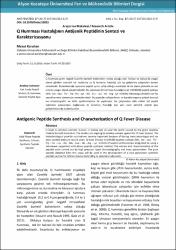Q humması hastalığının antijenik peptidinin sentezi ve karakterizasyonu
Abstract
humması gram negatif Coxiella burnetii bakterisinin sebep olduğu tüm Türkiye ve Dünya’da yaygın
olarak görülen zoonotik bir hastalıktır ve Q humması hastalığı için aşı geliştirme çalışmaları devam
etmektedir. Biyoteknolojik aşılardan peptid aşıları sahip olduğu avantajlar ile ön plana çıkmakta ve son
yıllarda yaygın olarak çalışılmaktadır. Bu çalışmada Q humması hastalığına ait m1E41920 peptid epitopu
(NH2‐ Ser ‐ Leu ‐ Thr ‐ Trp ‐ His ‐ Lys ‐ His ‐ Glu ‐ Leu ‐ His ‐ Arg ‐ Lys –COOH) mikrodalga destekli katı faz
peptid sentezi yöntemiyle sentezlenmiştir. Bu peptidin saflaştırılması ve karakterizayonu yüksek basınçlı
sıvı kromatografisi ve kütle spektrometresi ile yapılmıştır. Bu çalışmadan elde edilen saf peptid
polimerik adjuvanlara bağlanarak Q humması hastalığı için yeni nesil sentetik peptid aşısı
geliştirilmesinde kullanılacaktır. fever is common zoonotic disease in Turkey and all over the world caused by the gram negative
Coxiella burnetii bacterium. The studies are ongoing to develop vaccine against for Q fever disease. The
biotechnological peptide vaccinations become important because of having many advantages and has
been studied widely in recent years. Q fever Disease m1E41920 peptide epitope (NH2‐ Ser ‐ Leu ‐ Thr ‐
Trp ‐ His ‐ Lys ‐ His ‐ Glu ‐ Leu ‐ His ‐ Arg ‐ Lys –COOH) of peptid synthesization integrated by using a
microwave supported solid phase peptide synthesis method. The extract and characterization of this
peptide were carried out by high pressure liquid chromatography and mass spectometer. The pure
peptide obtained from this study will be used in the development of a new generation synthetic
peptide vaccine for Q fever disease by binding to polymeric adjuvants.
Source
Fen ve Mühendislik Bilimleri DergisiVolume
17Issue
1URI
http://fenbildergi.aku.edu.tr/wp-content/uploads/2017/04/017101312-317-1.pdf2149-3367
http://hdl.handle.net/11630/4615
Collections
- Cilt 17 : Sayı 1 [41]



















